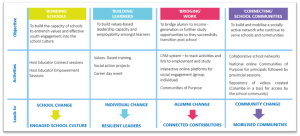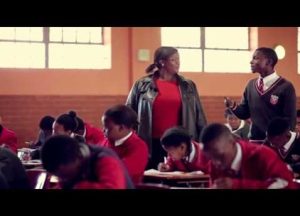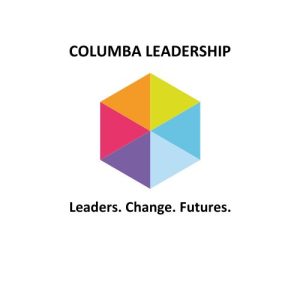
Columba Leadership activates youth in South Africa to make a difference in classes, schools, and communities; fosters a community of teachers and learners; and encourages and promotes civic awareness and engagement
Vision
Columba’s purpose is awakening the leader within to change lives and their communities. Columba’s vision is to ignite a movement for meaningful change in South African communities which is driven by our network of values-based leaders.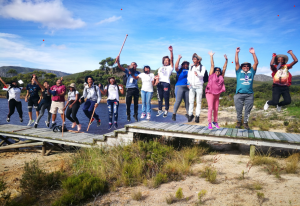
South Africa needs:
- Active citizens to take our country forward
- Leaders with character, values and a sense of purpose beyond self interest
- Young employees with initiative; agency and problem-solving ability, open to learning to enter our workspaces
- Students with self -discipline to succeed in further study
- Entrepreneurs who create work
Yet, South African Schools are not developing these fundamental attributes. Columba works with high schools throughout South Africa to address these urgent needs. Columba provides students with leadership skills, who as future leaders will return to their schools and communities to develop projects that make a meaningful difference in their own lives and those around them.
Our Response/ Objectives:
Columba’s belief is there is inner greatness to every young person. The task is to elicit this potential.
Led by our ethos, Columba aims to flip the script on poor youth outcomes.
We aim to do this though our powerful values-based leadership program and methodology that develops youth as well as principals and educators.
Adopting a substance over speed approach Columba journeys with schools over 5 consecutive years (3 years of intervention and 2 of sustainability support). We also work with youth from high school through to post matric.
The program aims to assist youth and school communities to address some of the underlying issues holding them back as they lead social action projects.
The journey starts, however, with self-discovery and self-leadership. This expands to their making a social contribution through teamwork and collaborating with others in projects. As they serve so they grow and learn skills and develop competencies that help them cope at school, post school and in life in general.
The impact is great:
- Improves educational outcomes.
- Strengthens schools.
- Connects a community of values-driven leaders.
History
Columba Leadership is a multiple award-winning national social impact NGO with a 15-year track record, having worked in 315 schools and with more than 12,600 youth and adults from high schools in economically disadvantaged areas across the country.
Columba has evidence of a deep impact on a national scale. Results include: school completion, higher academic results, and formal leadership roles at school. Besides working with the pupils/students the Columba approach also supports schools to create an enabling environment for teaching, learning and youth development. Columba brings a fresh approach that galvanises individuals, schools, and local communities to realise their inherent potential and seize the opportunity to make a meaningful difference in their own lives, schools and those around them. Our leadership program and powerful community development initiative continues to build its successful long-term partnership with the Department of Basic Education and schools serving under-resourced communities across the country with the aim to empower learners, educators and principals to resolve a multitude of challenges faced in as individuals in the schools and their respective communities.
Activities
Columba partners with schools. Columba enables the space, capacitates the key players, provides ongoing support and establishes the platforms that ensure learning, sharing and agency are embedded.
The Columba Leadership program involves the whole school community. It is aimed at building the capacity of schools to entrench values and turn learners into leaders through effective youth engagement. Not only are Columba partner schools sites for positive change; learners are developed in ways that make them socially conscious, active change agents and better able to effectively transition into work or further study after school.
Our Overall Objectives:
Building Leaders Values-based Leadership is developed in schools
Bonding Schools Schools are capacitated to entrench values and enable youth engagement as part of the school culture.
Connecting Communities Schools are connected to other schools for learning, sharing and support in communities of purpose.
Through a socially active network youth are supported through online resources and encouraged to share their journeys with Columba after leaving school.
Overview of the Change Journey
The Columba Model
The Columba Program consists of several interrelated elements aimed at developing resilient young leaders and strengthening schools through a transformed culture.
The students are selected for the 5-day Residential academy through a process which first involves the Columba team presenting the program to the students and explaining the value and meaning. In this session, they are motivated to understand that they have potential and can add value to their environment. The students must then write a motivation letter to become part of this movement of activated leaders. A diverse group of youth is selected based on our selection criteria including shy, underperformers, leadership potential, high achievers and moderate behavioral issues.
Columba typically partners with a school for 3-5 years, working with new cohorts of participants each year while supporting the school to institutionalize a values-based youth engagement model for sustained impact and offering lighter touch support in years 4 and 5 as schools sustain the approach.
The Columba Leadership Program includes:
- Residential Values-based Leadership Academies for learners, educators and principals, which focus on 6 key values. The Academy reinforces a code of responsible leadership with each day focused on one of the 6 values and relying on experiential, self-reflective, and dialogue sessions zto ensure the participants can internalize these values. The values and content include, but not limited to the following:

Awareness of myself, others and the environment: • Emotional intelligence • Self-motivation • Tolerance of diversity • Custodianship of the natural environment
Focus: • Goal setting • Purpose and direction • Time management • A future orientation
Creativity: • Critical thinking • Paradigm shifting • Problem-solving • Teamwork
Integrity: • Honoring one’s own potential • Responsibility • Honesty • Being driven by a moral/ethical compass
Perseverance: • Grit and resilience • Character • Determination • Teamwork
Service: • Active citizenship • Social responsibility • Servant leadership • Collaboration and networking for impact
The 3 -day Residential Educator Empowerment training focuses on:
Personal development
- connecting educators to a sense of purpose and as a source of deep-rooted motivation.
- The promotion of investment in self-development and wellness.
Relationship Building
- Building relationships of mutual trust and respect and understanding of youth.
- Collaboration and mobilization of peers to be part of school strengthening activities.
- Developing networks for support of learners.
Professional Development in aid of creating a conducive teaching and learning environment
- Classroom management through values and effective youth engagement approaches and practices.
- Promotion of values at school.
- Schools-based Programs– Working with learners, educators and principals to learn and integrate the values of ethical leadership, character, purpose and 21st-century skills. Complemented by youth-adult partnerships, peer-to-peer engagement and the establishment of youth engagement platforms and processes, these values are transferred throughout the school achieving a significant impact multiplier effect and sustaining the impact after we exit. Schools are empowered to entrench values and enable youth engagement as part of the school culture, building relationships of trust and mutual respect amongst adults and learners and in the process creating a more conducive environment for learning and development.
The toolkit, which is provided to all leaders, is a printed booklet. This tool allows youth to track their journey and their own growth by looking at different wellness areas, including emotional, social, academic, physical and financial. It prompts them to gradually prepare for the future with information on CV writing, career research and motivation letters.
Representative Council of Learners (RCL) Value -based Leadership Training takes place with an estimated 45 learners (dependent on size of the RCL). This training takes place in the first or second term of the academic year with leaders elected by the school. The training assists them to:
- Practically apply what they learned through running projects that tackle real-life challenges in the school and community and develop a range of skills in the process,
- Mobilize the involvement of others, and
- Build a school culture with values and youth engagement at the center.
Social Action Projects – Student learners, educators, and principals are organized around youth-led, adult-supported social action projects that are self-driven and self-sustaining. Learners and adults work together to bring about change in the school by identifying priority issues holding schools and learners back, establishing collaborative leadership and action teams, and implementing social change projects.
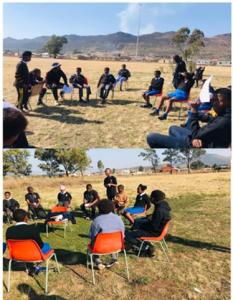
Bulelani Secondary School Eastern Cape
Nokwanda Primary feeder school Bulelani leaders are truly exemplifying the multiplier effect. They have initiated a 1- Day Academy program to actively impart the values they received from their Academies into young learners in their community. They have officially adopted Nokwanda Primary Feeder School as the pilot group. Nokwanda Primary School was selected as the school learners were showing signs of destructive behavior. The school is burdened by a high prevalence of substance abuse, bullying and violence. Leveraging their strong communication skills, collaboration, and contextual awareness, the integrated group held their first 1-Day Academy at the school. While initially managing the group and getting them to actively participate was a challenge, the primary learners left feeling more familiar with the values. It is extremely exciting to see the movement growing. Nokwanda learners have committed to continuing these social action projects in the future.
Palmridge Secondary School (Gauteng) Palmridge Secondary School has social action projects that run throughout the year. Their drug awareness project is not an event but an ongoing transformational process. Collaborations between educators and learners included using graffiti art to scribe anti-drugs messages as well as anti-bullying and anti-GBV messages on a designated wall. Another social action project involves the establishment of a book club within the school. The initiative stimulates interest in books. The club creates opportunities to explore different and fresh ideas on what they can write about. Some learners even shared they would like to take interesting photos to attract a readership for whatever the school will be publishing. Some learners have shared interests and hopes of writing journals and autobiographies about their journeys throughout their schooling years. This project creates a great possibility of unearthing unspoken experiences by both learners and educators.
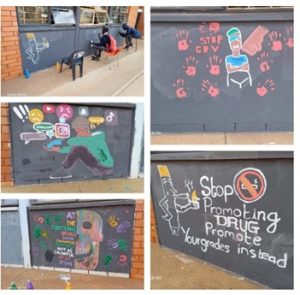
Audiences Served
Young people aged 15 to 25 years residing in marginalized and underserved communities, are primary beneficiaries of Columba Leadership’s work. Columba’s core program runs for three years from Grade 9 or 10 until the end of high school. “I learnt that I am strong and if I could believe in myself and tell myself that I can do it I could become whatever I want in life.” Learner, Sipho Camagu High School
Most of the youth, adults and schools that are engaged, face a range of complex individual, structural, contextual and environmental challenges that compound their vulnerability. Columba’s social innovation model has a demonstrable impact on an individual level, as well as at the school and community level and contributes towards the sustainable development and empowerment of youth from poor communities. Please see Youth Voices: https://youtu.be/zDM5KAmo1Dg (3 minutes, 2018)
Principals: Columba only works in public government schools, with 70% of these schools being quintile 1-3 or no-fee schools. The schools and principals we work with also tend to have the highest number of historically disadvantaged learners, and the capacity of schools is built over a 3-year partnership for sustainability.
Educators: Often overwhelmed, working with an under-resourced environment and impacted upon by disengaged learners and a range of social ills dragged in from communities. “This has been such an awesome experience (life-changing). Thank you so much. Please do this for the rest of our young people. They need you to help them so they can help others.” Educator, Ravensmead Secondary School
Alumni network: Once youth exit high school, they are invited to join Columba’s alumni network, and they participate through various in-person and virtual platforms. The alumni network supports youth to contribute to society through social initiatives, offers them peer support, and provides access to scholarships, employment, enterprise, and internship opportunities. Currently, there are 7507 registered Alumni, of which 1500 are actively engaged.
Impact
Student Learners
Despite the South African government investing 13.7% of the consolidated government expenditure of R2.3 trillion (2024/2025) in Basic Education, 4 in 10 learners that enter the schooling system in grade 1 will drop out before completing grade 12 (matric). Combined with the staggering national unemployment rate (33.5%- Labour Force Survey Q2 2024); learners who do not complete school are most at risk of not securing training or employment opportunities.
The Columba Program promotes protective factors that help keep learners in school and on track. On average over the past 5 years (2019-2023). Columbans have outperformed the South African National standards with a 92% School Learner Retention Rate and 81% of learners achieving a pass rate that allows them to pursue further studies.
Resilient learners are more likely to successfully transition into post-school opportunities, as reflected in our track record, with an average of 65.6% of students actively engaged in further or higher education within six months of leaving school.
-
-
- 93% learner retention of participants for Matric of 2023
- 78% of Columba matriculants assumed a formal leadership position at school in 2023
- 95% passed matric in 2023, of which 85% with a Bachelors or Diploma level pass. CLT learners continue to outperform national stats
- 50% transitioned successfully into further study, upgrading their results or employment (within 6 months of leaving school). Please See: https://youtu.be/zDM5KAmo1Dg
-
Educators
-
- 93% report program extremely positive contribution to their professional development
- 89% of educators surveyed report that their engagement with learners was much improved
- Omidyar Network from San Francisco conducted Lean Data research through Acumen. A net promoter score of 50 is considered excellent we achieved 90 for educators and 69 for district officials respectively. https://www.columba.org.za/assets/research_papers/omidyar-lean-data-columba-leadershipresults.pdf
Schools
We conduct quarterly school culture assessments to track our partnering schools’ progress towards creating a conducive environment for learner engagement. The assessment probes around our School Culture Index constructs: Shared Leadership, Youth- Adult Partnerships, Youth Engagement, Youth Referral and Learning and Sharing. The last construct, Adult Approachability, is measured through engagement observation.
The assessment probes around our School Culture Index constructs: Shared Leadership, Youth- Adult Partnerships, Youth Engagement, Youth Referral and Learning and Sharing. The last construct, Adult Approachability, is measured through engagement observation.
A color coded School Diagnostic Tool allows for quick flagging where intervention is required. Please see a link to a recent video that shows youth-adult partnerships and the impact of youth-led social action. https://www.youtube.com/watch?v=E49y9kE01B0&feature=emb_logo
The Transformation on Manyano Secondary School, Khayelitsha. (video: 6minutes, 2015) https://youtu.be/NyNs0OYRm7s
External Studies:
- Columba Leadership Impact on Learner Engagement, School Culture and Retention: Evidence from two schools Dr Andrew Hartnack March 2022
In February 2022 Columba appointed an independent consultant Dr. A. Hartnack to determine CLT impact on learner engagement and retention through case studies at 2 Western Cape schools by examining:
How a shift in school culture leads to schools achieving better results
How Columba Leadership partnering with a school supports learners to stay in school
Outcome: Dr. Hartnack found that whilst it was difficult to judge Columba Leadership’s direct impact on the school’s academic results – which are affected by many different and complicated factors, Columba impacts on broader systemic factors e.g. learner engagement; leadership quality of school leadership team; a safe and caring school environment; a healthy and constructive approach to school discipline; the fostering of creativity and broader learning beyond the narrow curriculum; and the desire to ensure that learners in all grades remain in and do well in school was evident at both schools. (Report available at request)
2. Research Report on the Columba Leadership Multiplier – Schools Reaching Out to Schools Dr Andrew Hartnack June 2018
SchoolsReachingOut_DrHartnack (1).pdf
3. Omiydar Research links:
04.23_Lean Data @ Columba Leadership_District and Funders (2).pdf
omidyar-lean-data-columba-leadershipresults.pdf
Recommendations for Replication or Adaptation
Columba Leadership Trust’s approach for replication of the model is focused on making it possible for the schools that we work with to deliver and sustain effective practices and processes themselves, so that they become sustainable entities.
A school sustainability toolkit can support replication by other schools interested in developing a school culture with youth engagement at its core.
Learner toolkits provide a self-directed pathway of activities through the last few years of high schools in support of personal mastery during school and know-how to navigate life after school. This tool allows youth to track their journey and their own growth by looking at different wellness areas, including emotional, social, academic, physical and financial. It prompts them to gradually prepare for the future with information on CV writing, career research and motivation letters.
We think it possible and valuable for students to be trained as leaders in most school environments, especially those where youth are less privileged. This requires participation in the vision and action of students, educators, and members of the community. The Columba model presents an opportunity for replication or adaptation in other countries and local communities.
Contact
Contact person: Jocelyn Freed, Fundraiser
E-mail address: Jocelyn@columba.org.za
Website: www.columba.org.za
Address: 3rd Floor; 132 Jan Smuts Avenue; Parkwood; 2193
Phone number: +27 011 440 5790
Mobile number: +27 0837082569
https://www.facebook.com/columbaleadership/
https://www.youtube.com/channel/UCyJ2A_mDlxbFqN8j9XEyh3Q
https://www.linkedin.com/company/columba-leadership
https://www.instagram.com/columbaleads/
Impact
Student Learners
Despite the South African government investing 13.7% of the consolidated government expenditure of R2.3 trillion (2024/2025) in Basic Education, 4 in 10 learners that enter the schooling system in grade 1 will drop out before completing grade 12 (matric). Combined with the staggering national unemployment rate (33.5%- Labour Force Survey Q2 2024); learners who do not complete school are most at risk of not securing training or employment opportunities.
The Columba Programme promotes protective factors that help keep learners in school and on track. On average over the past 5 years (2019-2023), Columbans have outperformed the South African National standards with a 92% School Learner Retention Rate and 81% of learners achieving a pass rate that allows them to pursue further studies.
Resilient learners are more likely to successfully transition into post-school opportunities, as reflected in our track record, with an average of 65.6% of students actively engaged in further or higher education within six months of leaving school.
CLT learners continue to outperform national stats
- 93% learner retention of participants for Matric of 2023
- 78% of Columba matriculants assumed a formal leadership position at school in 2023
- 95% passed matric in 2023, of which 85% with a Bachelors or Diploma level pass.
- 50% transitioned successfully into further study, upgrading their results or employment (within 6 months of leaving school). Please See: https://youtu.be/zDM5KAmo1Dg
Educators
- 93% report program extremely positive contribution to their professional development
- 89% of educators surveyed report that their engagement with learners was much improved
- Omidyar Network from San Francisco conducted Lean Data research through Acumen. A net promoter score of 50 is considered excellent. We achieved 90 for educators and 69 for district officials respectively. https://www.columba.org.za/assets/research_papers/omidyar-lean-data-columba-leadershipresults.pdf
Schools
We conduct quarterly school culture assessments to track our partnering schools’ progress towards creating a conducive environment for learner engagement. The assessment probes around our School Culture Index constructs: Shared Leadership, Youth- Adult Partnerships, Youth Engagement, Youth Referral and Learning and Sharing. The last construct, Adult Approachability, is measured through engagement observation.
A color-coded School Diagnostic Tool allows for quick flagging where intervention is required
Case Study Video
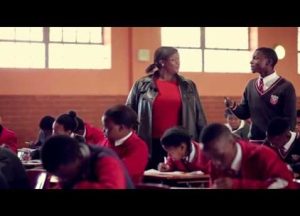
The Transformation on Manyano Secondary School, Khayelitsha. (6minutes, 2015)
External Studies:
1. Columba Leadership Impact on Learner Engagement, School Culture and Retention: Evidence from two schools Dr Andrew Hartnack March 2022
In February 2022 Columba appointed an independent consultant Dr. A. Hartnack to determine CLT impact on learner engagement and retention through case studies at 2 Western Cape schools by examining:
How a shift in school culture leads to schools achieving better results
How Columba Leadership partnering with a school supports learners to stay in school
Outcome: Dr. Hartnack found that whilst it was difficult to judge Columba Leadership’s direct impact on the school’s academic results – which are affected by many different and complicated factors, Columba impacts on broader systemic factors e.g. learner engagement; leadership quality of school leadership team; a safe and caring school environment; a healthy and constructive approach to school discipline; the fostering of creativity and broader learning beyond the narrow curriculum; and the desire to ensure that learners in all grades remain in and do well in school was evident at both schools. (Report available at request)
2: Research Report on the Columba Leadership Multiplier – Schools Reaching Out to Schools Dr Andrew Hartnack June 2018
3. Omiydar Research links:
Recommendations for Replication or Adaptation
Columba Leadership Trust’s approach for replication of the model is focused on making it possible for the schools that we work with to deliver and sustain effective practices and processes themselves, so that they become sustainable entities.
A school sustainability toolkit can support replication by other schools interested in developing a school culture with youth engagement at its core.
Learner toolkits provide a self-directed pathway of activities through the last few years of high schools in support of personal mastery during school and know-how to navigate life after school. This tool allows youth to track their journey and their own growth by looking at different wellness areas, including emotional, social, academic, physical and financial. It prompts them to gradually prepare for the future with information on CV writing, career research and motivation letters.
We think it possible and valuable for students to be trained as leaders in most school environments, especially those where youth are less privileged. This requires participation in the vision and action of students, educators, and members of the community. The Columba model presents an opportunity for replication or adaptation in other countries and local communities.
Contact
Contact person: Jocelyn Freed, Fundraiser
E-mail address: Jocelyn@columba.org.za
Website: www.columba.org.za
Address: 3rd Floor; 132 Jan Smuts Avenue; Parkwood; 2193
Phone number: +27 011 440 5790
Mobile number: +27 0837082569
https://www.facebook.com/columbaleadership/
https://www.youtube.com/channel/UCyJ2A_mDlxbFqN8j9XEyh3Q
https://www.linkedin.com/company/columba-leadership
https://www.instagram.com/columbaleads/

